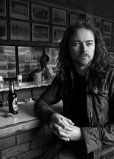 The Boghole
The Boghole
I poured the milk into the cup of hot black tea
until the surface clouded over and lightened
with coils of steam, like the genie of memory rising out
from the uncorked bottle of the forgotten.
The turf-brown tea settled at the brim of the cup,
as silent as the guilty bog-water that brimmed the wide boghole
I had walked away from, many years ago, when I was a child.
It was a deep boghole, a blind eye, beside a burnt oak tree
whose branches, like exposed nerve endings,
signposted its fatal spot in the middle
of the vast gouged-out turf-fields.
As I returned, that day, to Uncle Frank's pub at the Duneen crossroads
through the coconut scent of the yellow whin bushes
the palms of my hands were still stinging, reddened,
branded by the weight and the coarse fabric of the turf-sack
and all around was the echoing liquid call of the curlew
marking out the hollow tent of the sky—the amphitheatre
that had been listening all along to the puppy-yelps muffled in the turf-sack
and my heavy footsteps dragging them to the boghole.
The mute colosseum of the firmament gasped
as the tossed sack whirred through the air,
hit the bull's eye of the boghole
bobbed, seemed to float, then slowly sank.
As I turned and fled my footsteps were lighter
but the naivety of my bravery weighed down
my outsized wellington boots with a heavier tread.
In my pocket was the fifty pence piece,
the Judas-coin, that Uncle Frank had given me
to do the man's job he didn't have time to do
and overhead, the crowded audience of the sky
darkened in disbelief.
As I sit here, years later, and lift the teacup to my lips, I realise
I have been bringing sacks to that boghole ever since—
the pups of what I cannot reveal to anyone
pushing the visage of their cave-art paws
out through the sacking
and in my head I can still hear Uncle Frank's well-greased till
shoot open like a bullet and hit home with a ring.
And I still see, beside the boghole, on the wizened trunk
of that burnt oak tree, the eye of a twisted knot staring out like the drowned.








